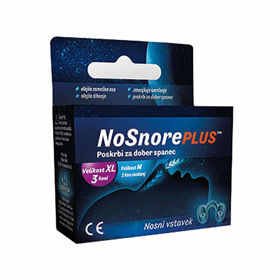Customer question:
What helps against snoring? Anonymous customer's question
Pharmacist's answer:
- Sleep on your side: If you know, you snore at night and usually sleep on your back, try sleeping on your side. If you're having trouble re-establishing sleep habits, consider using pillows strategically to ensure comfort and keep your body and head in a lateral position.
- Wear a nasal strip or dilator: Nasal dilators improve airflow during sleep. They are designed to open the nostrils to improve and increase airflow through the nose. These devices are either external nasal strips or internal nasal dilators.
- Use an anti-snoring mouthpiece: There are various dental aids available to relieve snoring. These mouthguards are usually designed to fit over your teeth and then adjust to move your lower jaw forward. This minor jaw adjustment helps reduce snoring.
- Mouth exercises: Besides general exercise, consider mouth exercises to prevent snoring. Oral exercises involve repeatedly moving your tongue and parts of your mouth to strengthen the muscles of your tongue, soft palate, and throat. Oral exercises are effective in reducing snoring.
- Avoid alcohol before bed: Not only does alcohol increase snoring, but drinking before bed can even cause obstructive sleep apnea in people who do not have the disorder. The effect of alcohol on snoring and sleep depends on the dose, so if you drink more of these drinks, start with self-restraint. If this doesn't reduce your snoring, try stopping drinking until a few hours before bed or quitting alcohol altogether.
Interesting reading: Borrelia signs on the skin pictures













